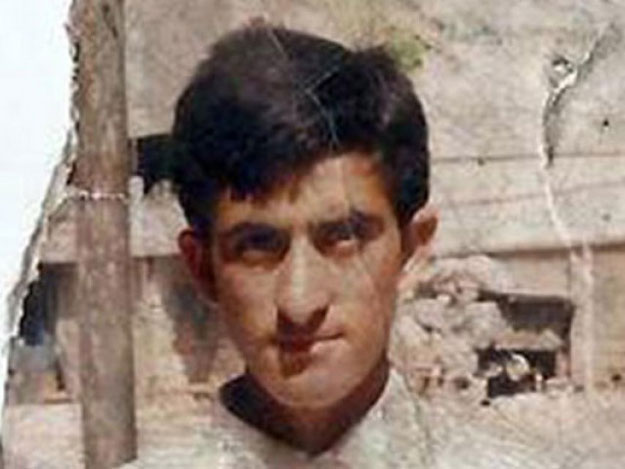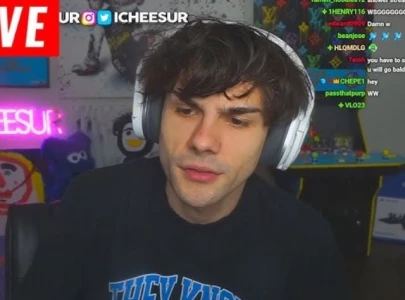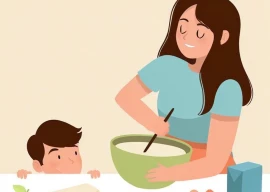
An anti-terrorism court in Karachi gave instructions Thursday to hang Shafqat Hussain, convicted of killing a seven-year-old boy in 2004, on March 19.
Hussain's case has triggered outrage from rights campaigners, who complain he did not get a fair trial and was only 15 at the time of the killing.
Read: To the gallows: Fresh black warrant sought for Shafqat Hussain
His mother Makhni Begum, who last saw Hussain in jail in 2005, insisted he was innocent in an emotional interview with AFP in Kashmir, where the family are from.
"All my hopes are shattered today. I have no faith in the justice of this country," she said, tears rolling down her cheeks.
"It was my last desire to see my son but now this hope is also dying. Now I am pleading with God for my son's life."
Hussain was working as a watchman in the sprawling, violent metropolis of Karachi in 2004 when a seven-year-old boy went missing from the neighbourhood.
A few days later the boy's family received calls from Hussain's mobile demanding a ransom of half a million rupees ($8,500 at the time), according to legal papers.
Read: ATC issues death warrants for 'underage' convict Shafqat Hussain
Hussain was arrested and during his first interrogation admitted kidnapping and killing Umair, whose body was found in a plastic bag in a stream.
Hussain later withdrew his confession, saying he had made it under duress, but the case came before an anti-terrorism court which sentenced him to death.
Begum said Hussain, the youngest of seven children, had run away from home to escape grinding poverty, hoping to make a better life for himself in Karachi, only for disaster to strike soon afterwards.
"One of our relatives called us from Karachi and let us know that our son is in Karachi and has been in jail in a murder case," she said.
Hussain had been due to face the noose on January 14 but the government halted the execution amid protests about his age, and ordered an investigation.
Read: Govt lifts death penalty moratorium completely: officials
Jail officials said Thursday the interior ministry had rejected the age plea and a fresh death warrant had been issued.
Begum and her 92-year-old husband Shahzullah, who has been paralysed down one side for 20 years, live in a two-room shack in a slum in Muzaffarabad.
Hussain's elder brother Manzoor Ahmad, who lives with his parents, insisted his brother was innocent.
"I appeal to higher government officials and judiciary not to execute our brother. He should be pardoned -- he was a juvenile and he did not commit any crime," he told AFP.
"Terrorism will not end but will flourish if innocent people are punished."
Read: Underage: Rights activists demand Shafqat Hussain’s release
Reintroducing the death penalty was part of Pakistan's move to step up the fight against militants since a Taliban massacre at a school in Peshawar in December.
The Human Rights Commission of Pakistan on Friday called upon Prime Minister Nawaz Sharif and Interior Minister Chaudhry Nisar to intervene to spare the life of Hussain.
In its letter, HRCP stated that in January, the interior minister had intervened to halt Hussain’s execution and stated in parliament that the government had arrived at the decision after information regarding issues around his case had reached the Ministry of Interior.
“The minister had announced that an inquiry would be conducted by the ministry on the concerns raised regarding Hussain’s conviction. No such inquiry has taken place and Hussain is now headed for the gallows on March 19,” the Commission said in a letter.
Read: Shafqat Hussain’s case: Last-gasp bid to save teenage convict
Human rights group Reprieve and the Justice Project Pakistan have initiated a petition to get Interior Minister Chaudhry Nisar to review the case. The petition has already garnered over 1,700 signatures.
The United Nations, the European Union, Amnesty International and Human Rights Watch have called on Pakistan to re-impose its moratorium on the death penalty.
Two men convicted of rape and murder were hanged in the eastern city of Faisalabad on Friday, bringing to 27 the total executed since the government rescinded its ban.
On Thursday EU diplomats raised the issue of capital punishment -- and Hussain's case specifically -- in meetings with Pakistani officials focused on trade and human rights.
The EU granted Pakistan the much coveted "GSP+" status in 2014, giving the country access to highly favourable trade tariffs, conditional on Pakistan enacting certain commitments on human rights.




1730959638-0/trump-(19)1730959638-0-165x106.webp)
1732436825-0/BeFunk_§_]__-(47)1732436825-0.jpg)



1732438009-0/BeFunk_§_]__-(48)1732438009-0.jpg)







COMMENTS (18)
Comments are moderated and generally will be posted if they are on-topic and not abusive.
For more information, please see our Comments FAQ